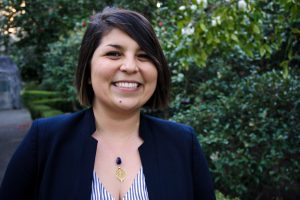Editor’s note: In first major disagreement, new City Council progressives get outvoted on spending priorities
It came as little surprise that the first big fight for new Sacramento City Council members Katie Valenzuela and Mai Vang centered on spending.
It also wasn’t a complete shock that the two progressives found themselves on the short end of the vote Tuesday night.
The council decided how to divvy up about $67 million available in the mid-year budget after sales taxes and cannabis taxes came in higher than expected. It set aside $1 million for a pilot project in participatory budgeting.
Valenzuela and Vang wanted $10 million a year for “participatory budgeting” to let residents in disadvantaged neighborhoods choose which projects to fund, pointing out that those areas have been especially hard hit during the COVID-19 pandemic.
“We should let the community tell us what they need to recover from this crisis,” Vang told colleagues.
“This is where our values meet our spending,” Valenzuela said.
Participatory budgeting is also backed by the Measure U Community Advisory Committee, which has been battling City Hall over how much of the additional half-cent sales tax approved by voters in 2018 has been going to police and fire instead of inclusive economic development for neighborhoods. The idea is also supported by groups advocating to “defund the police” and was a provision in the “strong mayor” measure defeated by voters last November.
But Mayor Darrell Steinberg said participatory budgeting still isn’t defined enough and the council is elected to make spending decisions.
The two new council members also proposed $5 million more for the new Office of Community Response, one of the most significant police reforms approved by the council last year following the George Floyd protests. The office will supervise social workers who respond to non-criminal 911 calls, including those involving the homeless and mentally ill. Eventually, money could be redirected from the Police Department, depending on how many 911 calls get diverted.
Their plan was defeated 6-3, with only Angelique Ashby siding with them.
The council then voted 7-2, with Ashby joining the majority, for a spending plan that included only $1 million for participatory budgeting and only $2 million for the community response office, which was created with $3 million last year.
Vang and Valenzuela later issued a joint statement that said Steinberg and fellow council members had refused to “meaningfully fund participatory budgeting and provide necessary funding for our unhoused neighbors whose lives are quite literally on the line.”
They also said their votes respected voters who passed Measure U.
Steinberg, however, put a different spin on the approved plan, calling it another major step toward fulfilling the promise of Measure U.
The largest item is $31.5 million for the city’s affordable housing trust fund to start investing in projects quickly. The plan put forward by Vang and Valenzuela called for $20 million, but Steinberg said it wasn’t enough for such an important priority.
Last year, the council approved the mayor’s plan to create a $100 million fund by borrowing money, but that was put off by the COVID-19 pandemic.
“We may come back to the bond in six months or a year, but if we can avoid indebting the city for millions of dollars for 30 years, I think that’s a prudent way to go,” Steinberg said in a statement. “We’ll build some great, great projects.”
The spending plan also includes $6 million for the youth programs, including mental health, academic support, violence intervention and workforce development.
Councilman Jay Schenirer calls it a “Children’s Budget” and argues that it represents a version of participatory budgeting because 130 people from 70 community organizations took part in four workshops to come up with priorities. “This is a way we can really listen to the community,” he told colleagues.
The approved mid-year budget plan also includes $5 million to relocate the North Sacramento library; $4.5 million for long-delayed Sacramento River Parkway Bike Trail between Garcia Bend Park and Zacharias Park; $4.4 million for the city’s climate change action efforts; and $1.5 million for improvements to Mama Marks Park, where a 9-year-old girl was fatally shot in October.
All the spending is on top of $89 million in federal coronavirus relief the city used to help small businesses, arts organizations and others.
“This is where our values meet our spending.”

While Valenzuela supported the other spending, she expressed frustration about the process, arguing that after the defeat of the “strong mayor” measure, the council—and not the mayor—should propose spending.
But Steinberg replied that he put forward his proposals to the council’s budget committee last week. At that meeting, he objected to City Manager Howard Chan’s proposal to add 10 positions to the Police Department. Vang and Valenzuela agreed, and Chan deleted it from the recommended plan approved Tuesday night.
“This is how it’s supposed to work,” Steinberg said.






Be the first to comment on "Sacramento budget battle"